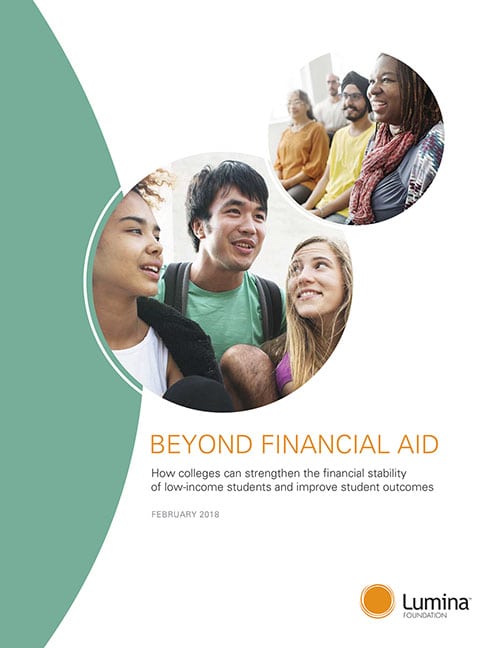While individual institutions such as Amarillo College, Morgan State University, and Georgia Gwinnett College have launched holistic efforts to help low-income students, two statewide systems—in Georgia and Tennessee—operate similar programs on a much larger scale.
The University System of Georgia and the Tennessee Board of Regents have embraced the tenets laid out in Lumina Foundation’s Beyond Financial Aid guidebook. The programs help with everyday expenses, such as transportation and child care, that often delay the progress of low-income students or prevent them from finishing college.
The Georgia system—serving more than 300,000 students in 26 institutions (including Georgia Gwinnett)—has fully adopted the Beyond Financial Aid approach. The guidebook’s principles are integrated into a statewide initiative aimed at increasing overall graduation rates, said Robert Todd, the system’s director of policy and partnership development.
 “We rolled it into the Complete College Georgia plan,” Todd said, which makes Beyond Financial Aid part of each institution’s approach to serving students from low-income families.
“We rolled it into the Complete College Georgia plan,” Todd said, which makes Beyond Financial Aid part of each institution’s approach to serving students from low-income families.
Child care, transportation and food insecurity were recurring themes when the system’s institutions assessed students’ needs. Still, system officials don’t dictate actions taken at individual institutions. “The locals have the flexibility to tailor the program to each school population’s needs,” Todd explained.
For example, at Dalton State College, local administrators saw the need for a food pantry, and so they created one, Todd said. It’s called the “Birdfeeder,” a nod to the school’s Roadrunner mascot.
And at Columbus State University, with a large population of adult learners, Todd said, “they knew if they didn’t address child care, they would lose a lot of students.”
So they addressed that problem in a very direct way. This fall, Columbus State has 70 students who each receive a $125 weekly check to offset child-care costs. “Boy, is that helping families,” said Lisa Shaw, who directs the university’s Academic Center for Excellence.
In Tennessee, the Board of Regents oversees 27 colleges of applied technology and 13 community colleges, serving a total of 118,000 students. The board recently integrated the Beyond Financial Aid initiative into its broader student success program. Now assistance for things like food and health care are offered right along with other supports such as expanded job-placement services and efforts to boost students’ financial literacy.
The goal is for each Tennessee institution “to identify local resources to help students overcome barriers,” said Heidi Leming, the board’s vice chancellor for student success.
Roane State Community College, in southern Tennessee, identified transportation and food insecurity as urgent needs, said Karen Brunner, vice president for institutional effectiveness, planning, and research.
With nine campuses in two time zones, Roane State has found that students often have difficulty getting to far-flung classrooms and labs. So the school’s foundation helps by offering transportation assistance, including money that students can use for gas or a tire repair, Brunner said.
On Roane State’s Cumberland County campus, many students needed to be fed. The college partnered with a local Baptist church to bring lunch to hundreds on campus once a month and twice during finals week. The college also teamed up with a Methodist church that provides Meals on Wheels service to the campus’ neediest students, Brunner said.
Although the statewide programs are relatively new, dating back to just 2016, each state system already has success stories to share.
Shaw tells the story of a woman who had twin sons, 17 months old. The student wanted to return to Columbus State to finish her junior and senior years and become a nurse, but in the past had been forced to choose between attending school or paying for child care.

“With the assistance from our child-care program, she was able to place her twins in child care with no out-of-pocket expenses and enroll in our nursing program,” Shaw said. “She graduated in two years and provided the twins with a jump start in early education and preparation for school readiness.”
At Roane State, Brunner points to the success of Makalea Alexander, a 33-year-old Army veteran and mother of two daughters.
By her own admission, Alexander has had a difficult journey. She struggled with drug addiction as a teenager, was discharged from the Army after failing a drug test and endured a difficult marriage before separating from her husband. She also has battled depression for years.
She said that when she enrolled at Roane State in 2015, the school helped her fill out the necessary paperwork for financial aid and then cut her a check ranging from $100 to $150 a month to help pay transportation costs. And when she completed her coursework to become an occupational therapy assistant, the school “paid for my state exam and background check—that’s more than $300—and paid for my state license, another $85,” she said.
Now Alexander works 30 to 40 hours a week, earning more than double the hourly rate she had earned in any previous job, she said.
“Roane State helped me get my life back on track, and now I’m able to provide for my daughters,” Alexander said.
“I want other people to get an education and feel the way I feel now. The college gave me confidence in myself.”
